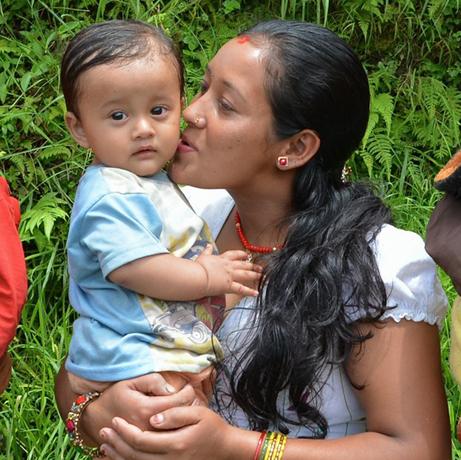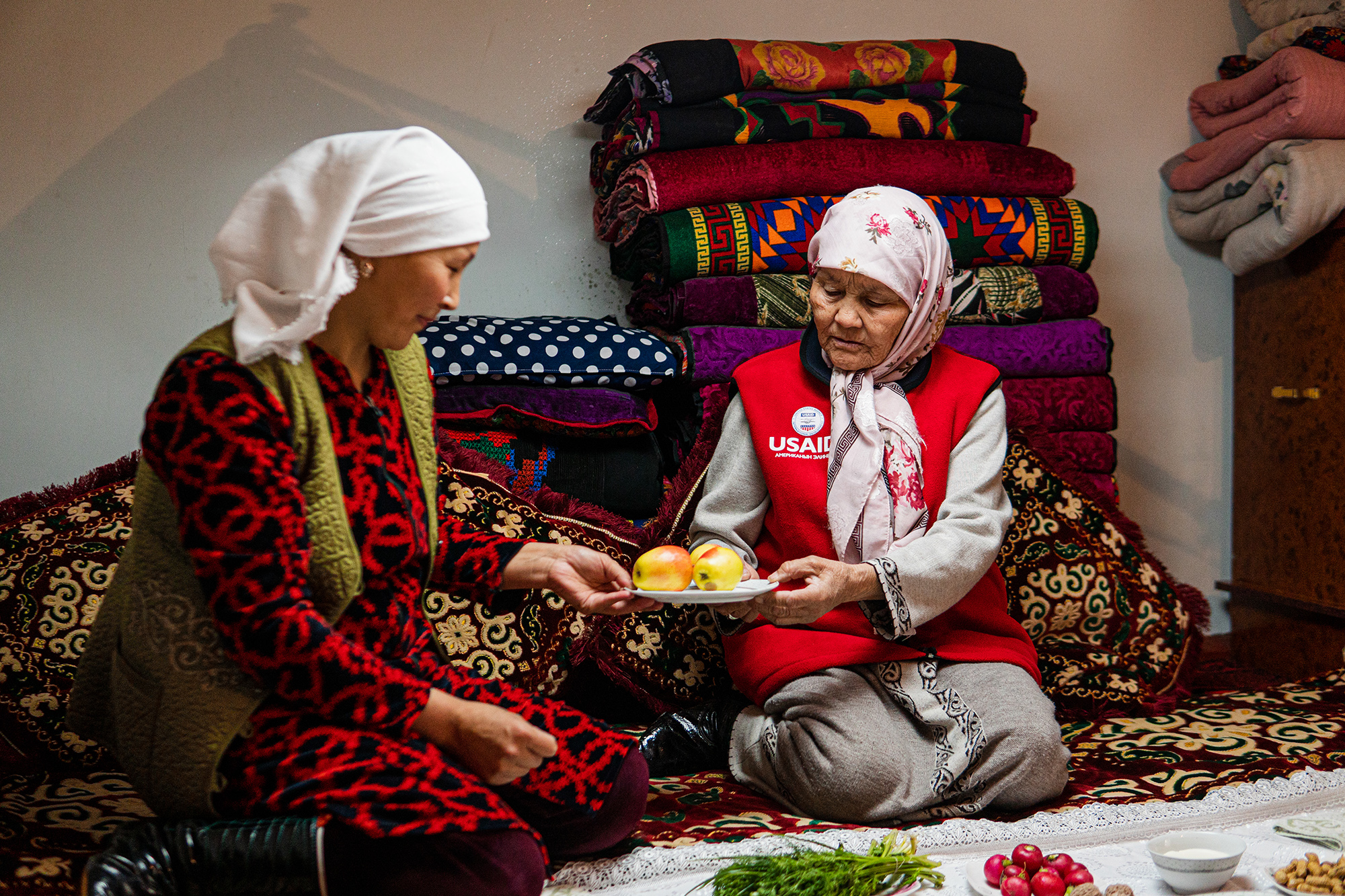Improving women's diets is essential to reducing poverty and hunger.
Boosting woman’s nutrition is essential for their health and well-being and has a ripple effect on the rest of her household and community. Well nourished women are better able to provide for themselves and their families.
Women’s nutrition is critical for maternal health, newborn survival, and child nutrition and has positive effects on future generations.
Women need more essential nutrients, like iron, folic acid, calcium, and vitamin D at key points in the life cycle. During pregnancy and lactation, extra calories and protein are essential for the health of a mother and her child. When women are undernourished during pregnancy, it increases the risks for poor outcomes during pregnancy and labor and for low birthweight babies.
During adolescence, girls are more vulnerable to malnutrition as rapid physical growth and dramatic physiological changes create increased demand for nutrients and energy. Their social status often results in higher demands for household labor, but smaller amounts of nutritious foods. Adolescence is a time for setting healthy food choices that foster optimal growth and development, so supporting adolescents with good nutrition can have a long lasting impact.

USAID Advancing Nutrition is generating learning around women’s diets and nutrition.
USAID identified a lack of programmatic evidence on how to improve women’s diets, especially during pregnancy and lactation. To help address these gaps, USAID Advancing Nutrition is generating evidence, identifying innovative practices, and sharing learning globally to inform the design and implementation of nutrition programs and interventions that improve women’s diets.
USAID Advancing Nutrition is generating learning around women’s diets and nutrition.
USAID identified a lack of programmatic evidence on how to improve women’s diets, especially during pregnancy and lactation. To help address these gaps, USAID Advancing Nutrition is generating evidence, identifying innovative practices, and sharing learning globally to inform the design and implementation of nutrition programs and interventions that improve women’s diets.

In the Interest of Every Woman’s Health and Nutrition
A woman’s nutrition is vital throughout the course of her life, for her own well-being and the well-being of her future children and community. Boosting a woman’s nutrition can have a ripple effect for society as a whole.

Establishing a Women’s Diets Learning Agenda
USAID Advancing Nutrition developed a learning agenda on women’s diets to guide work planning and synthesis of evidence and learning on women’s diets across the project’s multi-sectoral portfolio.

Addressing Adolescents’ Unique Nutritional Needs and Priorities
Pre-pregnancy health matters for positive maternal nutrition. USAID Advancing Nutrition's Adolescent Nutrition Resource Bank equips nutrition programmers to expand adolescent nutrition programs and services, especially for girls and young mothers.

Understanding Social Norms to Improve Women’s and Children’s Diets
Women’s and children’s healthy diets involve a constellation of behaviors practiced by a diversity of people. USAID Advancing Nutrition developed a guide on planning norm-responsive activities within nutrition-sensitive or nutrition-specific programming to improve women’s and children’s diets.

New insight reveals that 2 in 3 women worldwide are affected by micronutrient deficiencies.
1.2 billion women are affected by one or more micronutrient deficiencies worldwide. During pregnancy, poor diets lacking in essential nutrients like iodine, iron, folate, calcium, and zinc can cause anemia, preeclampsia, and hemorrhage in mothers, and neural tube defects in infants.
New insight reveals that 2 in 3 women worldwide are affected by micronutrient deficiencies.
1.2 billion women are affected by one or more micronutrient deficiencies worldwide. During pregnancy, poor diets lacking in essential nutrients like iodine, iron, folate, calcium, and zinc can cause anemia, preeclampsia, and hemorrhage in mothers, and neural tube defects in infants.

New Estimate of Micronutrient Deficiencies among Women of Reproductive Age Worldwide
USAID Advancing Nutrition’s comprehensive analysis of micronutrient deficiencies with data from 22 countries indicates that 69 percent of non-pregnant women globally experience micronutrient deficiency.

Advancing Micronutrient Measurement to Strengthen Data-Driven Decision-making
USAID Advancing Nutrition is working to improve how micronutrient deficiencies are measured to improve data quality and availability for nutrition programing, including anemia prevention and control, food fortification, and supplementation programming.

Tools to Assess Women’s Diet Quality
Low quality diets are a leading risk factor for poor nutrition and health for women throughout the world. USAID Advancing Nutrition is identifying existing tools and supporting the development of new ones to understand dietary consumption to strengthen multi-sectoral nutrition programming.

Social and Behavior Change Resources for Women's Healthy Diets: 5 Gaps and Recommendations
USAID Advancing Nutrition explored the availability of high-quality social and behavior change (SBC) resources for improving women’s diets in low- and middle-income countries by conducting a gap analysis of SBC resources.

Pregnancy is a critical time for good nutrition. The cost of maternal malnutrition is high for the mother, baby, and society as a whole.
Adequate maternal nutrition is the foundation of a pregnant woman’s health and can help to ensure a safe delivery. During pregnancy, poor diets can lead to deficiencies in key nutrients like iodine, iron, folate, calcium and zinc; increasing risk of anemia, preeclampsia, and hemorrhage in mothers; and preterm birth, low birthweight, impaired brain development, and neural tube defects in infants. Maternal underweight and overweight are additional risk factors for pregnant women.
The nutritional vulnerability of mother and child is the greatest during the 1,000 days between pregnancy and a child’s second birthday, which is a critical period of growth and development. It is crucial that women enter this stage well-nourished.
Pregnancy is a critical time for good nutrition. The cost of maternal malnutrition is high for the mother, baby, and society as a whole.
Adequate maternal nutrition is the foundation of a pregnant woman’s health and can help to ensure a safe delivery. During pregnancy, poor diets can lead to deficiencies in key nutrients like iodine, iron, folate, calcium and zinc; increasing risk of anemia, preeclampsia, and hemorrhage in mothers; and preterm birth, low birthweight, impaired brain development, and neural tube defects in infants. Maternal underweight and overweight are additional risk factors for pregnant women.
The nutritional vulnerability of mother and child is the greatest during the 1,000 days between pregnancy and a child’s second birthday, which is a critical period of growth and development. It is crucial that women enter this stage well-nourished.



USAID supports health systems to deliver iron and folic acid supplements, and counseling on healthy diets, as part of quality services to pregnant women and their growing families.
USAID’s proven maternal nutrition interventions also include increasing access to safe, diverse, and nutritious food, including fortified food, and promoting economic empowerment for women.
Watch the video and view this factsheet to learn more about USAID’s investment in maternal nutrition.

To address these gaps, and others, USAID Advancing Nutrition is working to promote optimal maternal nutrition around the world.
USAID’s investments seek to protect nutrition throughout the lifecycle to ensure that all women and children are well-nourished and able to live healthy and productive lives. As part of these interventions, USAID supports health systems to deliver iron and folic acid supplements and counseling on healthy diets to pregnant women. To promote maternal nutrition, USAID is also increasing access to safe, diverse, and nutritious food, including fortified food, and supporting economic empowerment for women.
To address these gaps, and others, USAID Advancing Nutrition is working to promote optimal maternal nutrition around the world.
USAID’s investments seek to protect nutrition throughout the lifecycle to ensure that all women and children are well-nourished and able to live healthy and productive lives. As part of these interventions, USAID supports health systems to deliver iron and folic acid supplements and counseling on healthy diets to pregnant women. To promote maternal nutrition, USAID is also increasing access to safe, diverse, and nutritious food, including fortified food, and supporting economic empowerment for women.

Strengthening Maternal Nutrition Components in the Health System
USAID Advancing Nutrition tested operational guidance to improve maternal nutrition, resulting in step-by-step recommendations to strengthen existing maternal nutrition components in services delivered by the health system, including actions to strengthen the overall health system and the enabling environment.

Partnering to Improve Maternal and Child Nutrition in Burkina Faso and Kenya
With USAID support, USAID Advancing Nutrition provided grants through the New Partnerships Initiative (NPI) to support four organizations in Burkina Faso and Kenya working to improve maternal and child nutrition.

Engaging Family Members to Improve Maternal Nutrition
Family members influence decision-making about food access, food distribution, maternal nutrition, and infant and young child feeding practices. USAID Advancing Nutrition’s program guidance for nutrition practitioners outlines practical recommendations on how to engage family members at key points in the program cycle.

Improving Understanding of Anemia for Nutrition Programs
USAID Advancing Nutrition’s anemia toolkit aims to provide relevant resources to improve the understanding of the various facets of anemia, its nature, significance, assessment, prevention, and control.
